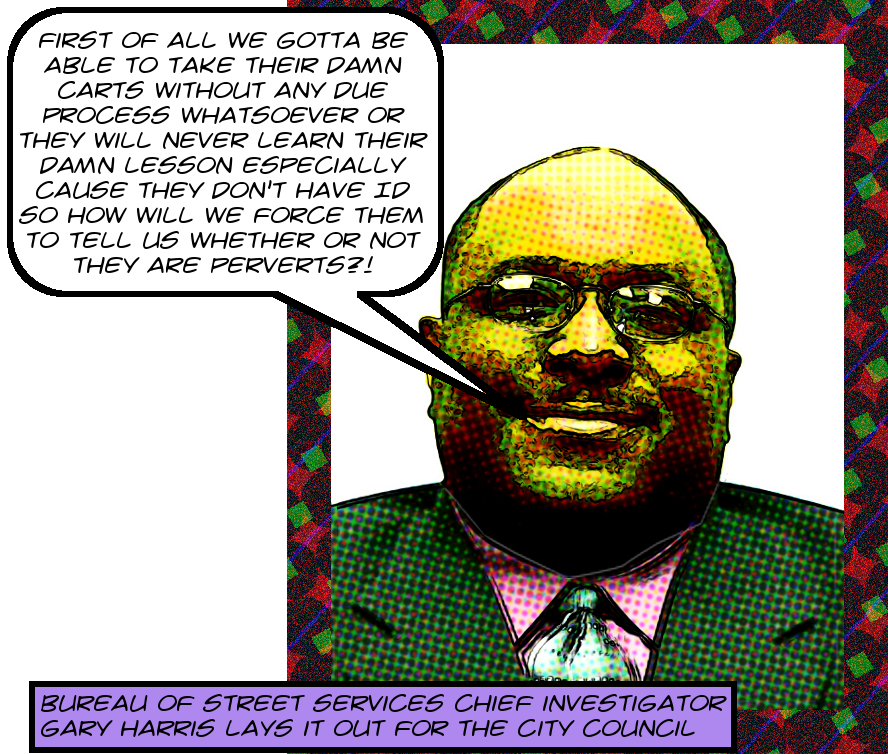 Even though it’s looking reasonably likely that Ricardo Lara’s deeply excellent sanity in street vending bill, SB 946, will become law when the legislature reconvenes very soon, the City of Los Angeles is still grinding away at developing its own regulation.1
Even though it’s looking reasonably likely that Ricardo Lara’s deeply excellent sanity in street vending bill, SB 946, will become law when the legislature reconvenes very soon, the City of Los Angeles is still grinding away at developing its own regulation.1
This whole mess, which we have been tracking forever through every last weirdo permutation, is memorialized in Council File CF 13-1493. And this is just a short note to announce that tonight Gary Harris, the chief investigator of the Bureau of Street Services, filed his report-back announcing what his department would like to see added to the law.
And its as unhinged as any of the other unhinged contributions to this discussion over the years. First of all, Gary Harris argues that the City must reserve the right to confiscate the equipment of unlicensed vendors without hearings and without appeals and, it appears, without benefit of the United States Constitution.2 Even weirder, he wants to use LAMC 56.11 as authority to confiscate carts.
This is of course the infamous anti-homeless personal property confiscation measure. It’s written to allow the confiscation of unattended personal property, which obviously doesn’t apply to street vendors’ equipment. Additionally, a federal court has already suspended enforcement of LAMC 56.11 in Skid Row, and it’s pretty clear that the only reason enforcement hasn’t been suspended City-wide is that no one has asked a court to do it. LAMC 56.11 is itself unenforceable and is hardly a tool to be basing a sustainable street vending policy on.
Second, Gary Harris wants to require background checks for vendors that vend near schools to make sure they’re not perverts or sex criminals. It all just really makes me wonder what City, what universe, these people are living in. Here’s the deal, Mr. Gary Harris. There are already vendors vending near schools. There are already unlicensed vendors.
And maybe some of them are perverts and sex criminals. But there are certainly not vast crews of sex criminals who are not now vending but will start vending when the City passes a law, if it ever does. That’s just kooky. Whether there is a law or not the number of perverts and sex criminals selling raspados near schools will not change. There’s no crisis now, so there’s no need to prevent a notional future crisis.
Turn the page for some more commentary along with a transcription of Gary Harris’s report-back.
The point is to stop tormenting our street vendors and arresting them, and confiscating the tools of their trade which, in many cases, represent a huge proportion of their capital, and preventing them from making their meager livings. The City can’t enforce its laws now, and making them even more intrusively creepy is not going to make them more enforceable.
The City government must begin to recognize and understand the invaluable and unique contribution that street vendors make to our City’s culture, to our Civic life. If they can’t do that, and it’s beginning to look like they can’t given the outsize influence of BIDs and other zillionaire policy pushers, they ought to just keep their hands off the vendors.
CITY OF LOS ANGELES
INTER-DEPARTMENTAL CORRESPONDENCE
DATE: July 16,2018
TO:The Honorable Bob Blumenfield, Chair
Public Works and Gang Reduction Committee
The Honorable Curren D. Price, Chair
Economic Development Committee
FROM:Gary Harris, Chief Street Services Investigator II
Bureau of Street Services
SUBJECT: CF# 13-1493 ORDINANCE TO AMEND MUNICIPAL CODE FOR PERMITTED STREET VENDING
SUMMARY
The Bureau of Street Services has reviewed the draft street vending ordinance for Council File 13-1493, and submits the below comments for consideration. The Bureau’s comments are designed to ensure effective enforcement without the need for criminal misdemeanor charges.
Recommendations for Effective Enforcement:
• Confiscation: for un-permitted carts, eliminate the proposed hearing-based confiscation process and allow confiscation and disposal under existing Los Angeles Municipal Code Section 56.11 for bulky items. Absent criminal penalties for unpermitted vending, enforcement personnel will not be able to compel unpermitted vendors to produce valid identification. Without positive identification, it would be impossible to compel a vendor to appear at a confiscation hearing. For permitted carts vending in violation of permit conditions, suspension or revocation of the permit is more practical to administer than a hearing-based confiscation process.
• Safety of School Children: require background examinations for vendors choosing to vend within 500 feet of schools. The proposed ordinance allows vending within 500 feet of schools if the vendor exclusively dispenses healthy food. California law requires background checks for all school employees to prevent registered sex offenders and other persons with violent criminal pasts from being employed around children. It is recommended that those persons applying to vend near schools are subject to a background check to ensure no prior convictions for specific crimes that would indicate a potential danger to school children. These proposed checks would be limited to relevant crimes specified in the regulations to be approved by the Board, and would not involve citizenship status or immigration-related violations.
If you have any questions or concerns please contact Gary Harris, Chief Street Services Investigator II, at (213) 847-6000.
Image of BSS Chief Investigator Gary Harris is ©2018 MichaelKohlhaas.Org and it’s really a pixelizitude of this Gary Harris here.
